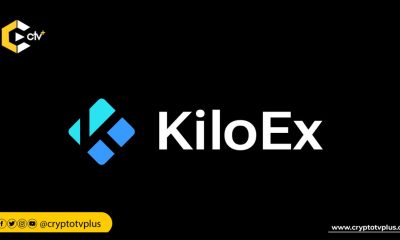FEATURED
New report shows surging interest in DeFi innovation by enterprises

In a recent report by Ripple, the world of Decentralized Finance (DeFi) was revealed to be garnering strong and growing interest among financial leaders. The report highlights the increasing enthusiasm for DeFi as a catalyst for innovation.
According to Ripple, almost half of the respondents expressed extreme interest in exploring DeFi as a means of driving innovation in the next three years.
An additional 30% expressed a very high level of interest in this transformative field. These findings underscore the widespread eagerness to embrace the potential of DeFi.
The versatility of DeFi is evident as it can be applied to various business needs. This includes facilitating business loans and sourcing funding for lending enterprises using digital assets such as stablecoins and cryptocurrencies. All of these operations are managed through smart contracts.
Financial institutions, especially those in institutional banking, have already embraced the idea of utilizing DeFi in these areas. This adoption is driven by macroeconomic factors such as shrinking credit availability and tightening credit conditions.
Digging deeper into the report’s insights, it reveals that financial institutions, in particular, are highly optimistic about integrating DeFi into their operations. Surprisingly, over 15% of these institutions claim to be actively exploring or using DeFi solutions.
The report further highlights that interest in DeFi is not limited to specific roles within the financial sector. Whether in digital transformation, blockchain, cryptocurrency, or more traditional finance roles like payments and capital markets, the interest levels in
DeFi remain consistently high. Interestingly, there was only a slight 3% difference in average response rates between the various aspects, with interest rates of 78% and 75% respectively.
Challenges of traditional financial and benefits of DeFi
The report also revealed that enterprises are seeking to address concerns such as borrowing and raising capital through institutional DeFi. High interest rates are a significant worry, which reflects the current global economic landscape.
Enterprises are facing various challenges related to capital, with the cost of raising capital being slightly more concerning than others.
“2/3 of enterprise finance leaders are familiar with using DeFi for trading, borrowing, lending, using digital assets to earn yield, and sourcing digital asset liquidity,” Ripple said.
The emergence of ICOs, IEOs, and other forms of raising capital in the crypto market has reduced the cost of raising money for both private and institutional investors.
Today, anyone with as little as $100 can have a chance to be part of several crypto projects as an early investor, which is very hard to accomplish in the traditional space.
For borrowing, DeFi has created a structure that sets the interest rate so low that it allows crypto users from anywhere around the world to access loans and repay them. Such platforms include DeFi Swap, Yearn Finance, and dYdX.
Ripple also noted that institutions are primarily attracted to some of the benefits of DeFi, including improved operational efficiency (46%) and better data management (45%).
Additionally, the report added that payment professionals, for instance, highly depend on 24/7/365 markets, which DeFi infrastructure provides, as opposed to traditional financial systems. Furthermore, financial inclusion emerged as a more frequently selected benefit than access to new markets and liquidity.
This shift reflects a commitment to the principles of decentralization and increased access to financial services, core tenets of the Internet of Value and web3.
Decentralized Identity in the financial world
The report shed light on the significance of Decentralized Identity (DiD) in the realm of compliance and secure transactions within institutional DeFi.
DiD solutions are expected to have a crucial role in the expansion of institutional DeFi by enhancing compliance capabilities and providing secure identity verification.
Considering the projected growth of the global market, which is valued at $65B in 2022 and expected to grow at a 90% CAGR, it is highly likely that DiDs will become indispensable for regulatory compliant and robust DeFi applications. They enable trustless transactions, thereby ensuring security.
The report also delves into the perceived impact and potential applications of DiD across various industries, offering a glimpse into an exciting future in this rapidly evolving space.
With ongoing investigations by platforms like Polygon, Hyperledger, and XRP Ledger, incorporating “zero-knowledge proofs” to safeguard user data and comply with regulations is a top priority.
Read also; How blockchain can save $10B in cross-border payments – Report
























